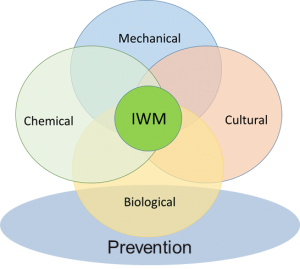Chapter 9: Weed Management Strategies
9.5 Integrated Weed Management (IWM)
Integrated Weed Management (IWM) principles are broader than simply weed control, but also take into consideration weed biology and ecology concepts. Research is indicating that weed management plans which incorporate IWM principles are the most successful, cost effective and sustainable long term partly due to the fact this approach is focused beyond a single season. This means a farmer will incorporate a variety of practices over the course of several years into their weed management plan. This helps control methods be more effective and less expensive, as well as help protect the environment. Environmental concerns can arise from chemical applications, as well as soil erosion from tillage practices. Therefore, while being more complicated to plan out, IWM is a more holistic approach that is also more profitable.
We have already discussed ways to prevent weed problems, one aspect of IWM. In the next chapters, we will discuss in detail the biological, cultural, mechanical and chemical approaches to control weeds.

Key concepts of IWM are:
- Use of multiple strategies to manage weed populations in a manner that is economically and environmentally sound.
- In addition to weeds present, the characteristics of the soil, water and desirable plants in the field, as well as the adjoining properties, are taken into consideration. For example, how do the soil properties and environmental conditions effect weed seed dormancy?
- Plans are developed to implement as many IWM techniques as are appropriate for the field site, addressing both the plants to reduce or eliminate and those to be protected. IWM also takes into consideration the cropping system. Utilizing IWM tools is also often useful in insect and disease management (Integrated Pest Management = IPM), reducing pesticides required to manage those challenges as well.
Review and Reflection